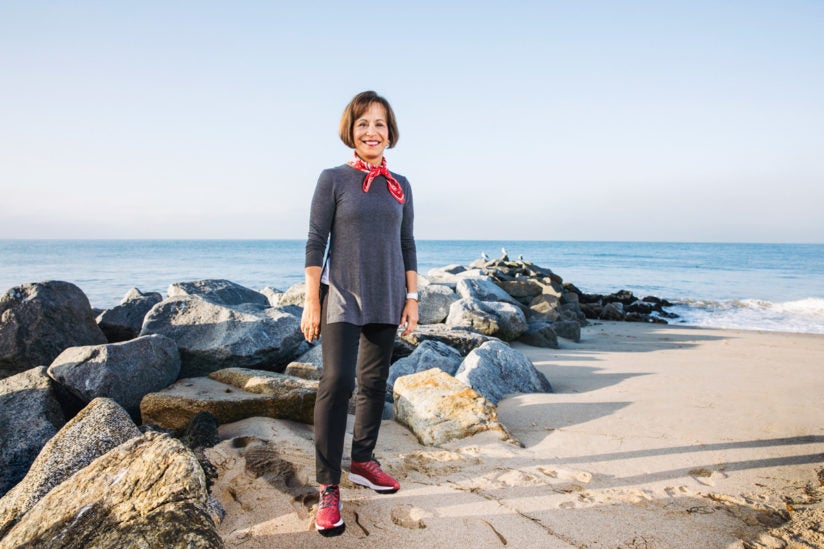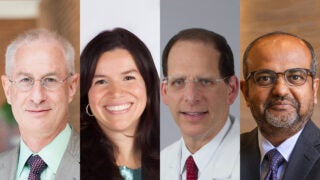
(Photo/Christina Gandolfo)
USC President Carol Folt’s Mission to Put Students and Discovery First
The aquatic biologist and noted academic leader returns to California to help the university write its next chapter.
She exited Pacific Coast Highway onto State Street and began the slow drive up Highway 154 into the Los Padres National Forest. Her orange Datsun pickup, packed with scientific equipment, trundled higher and higher along San Marcos Pass Road. She left the beaches, red tile roofs and palm trees of Santa Barbara behind for the mountains.
California in the 1970s and ’80s turned out to be a good place for Carol L. Folt to find herself. Akron, Ohio, would always be her hometown, but the creative energy in California had called the college student west. In her early 20s, she saw California as “the coolest place in the world.” Every sunrise offered possibility.
What would she learn from her research in the lakes and streams on the other side of those mountains? What discoveries would she make?
Today, years after she started her academic journey in California, Folt is back in her adopted home state — now as the experienced, yet still insatiably curious, new president of the University of Southern California.
College Days
Walk into the president’s office in the Bovard Administration Building, and Folt will greet you with a welcoming smile. Light streams in through gauzy Roman blinds.
Folt types at a standing desk if she can steal a moment between meetings, or more likely after the business day is over. She loves to get out of the office to talk with students, faculty, staff — finding out what excites them, what matters to them and what they want to change.
“My first year is going to be all about meeting and listening to people,” she says, “and moving things forward at the same time.”
That comes as no surprise. Talk about Folt with colleagues, and they mention common elements: She is energetic, listens curiously, gathers facts carefully, brings people together to solve problems and builds community. These traits stretch far back, even before her beginnings as a scientist and faculty leader.
One of five children, Folt grew up in a big family including her mother’s parents, hard-working immigrants from Albania. Her mom and dad, chemists who met at the B.F. Goodrich Co. in Ohio, emphasized education. “I was raised in a family where I was told I could do anything if I tried hard enough. They didn’t place limits on our dreams, and I think that was enormously important,” she says. “My parents nurtured science, experimentation and creativity. We’d march off to the art museum every month; we’d go to the library every week.”
After high school, she followed one of her brothers to Ohio State University. But she felt adrift and left after a year. Ready for adventure, she packed up and drove across the country with a friend to Santa Barbara City College, her gateway to the University of California.
Those were busy days. She paid for her tuition and rent by waitressing 20 to 30 hours a week, serving seafood at Moby Dick Restaurant on the wharf.
“The time I spent in a classroom brought me great moments of joy, in part because I had to really work to get there,” Folt says. “School felt like a privilege.”
After initial forays in studio art, Folt transferred to the University of California, Santa Barbara, and explored different disciplines. When she took courses in biology, something clicked. Even though she was one student in a sea of hundreds, the instructors’ passion for science was contagious. “The idea that I could design an experiment that would maybe answer a question that no one — in the history of the world — had ever answered? It was just so stimulating,” she says.
She found her future in biology, and with the nation embracing environmentalism (Earth Day was born in 1970), Folt was drawn into the burgeoning field of ecology and environmental science. Nothing made her happier than carrying buckets and nets through muddy streams to conduct experiments with classmates. She would go on to study plankton and other aquatic life. Later she made her name through research on climate change, salmon conservation and mercury and arsenic in water.
Folt left Santa Barbara to earn a doctorate in ecology at the University of California, Davis. A postdoctoral fellowship at Michigan State propelled her to her first job in academia as an instructor and eventually as a full professor holding an endowed professorship at Dartmouth College in Hanover, New Hampshire.

Her path to university leadership had begun — though she didn’t know it yet.
Folt built a highly successful research lab at Dartmouth. “I loved mentoring students, and I loved the scientific research we were doing,” she remembers, smiling at the memories. “Our discoveries were even more exciting because they were made as a team.”
To answer the large-scale, complex problems that interested her, “like rehabilitating habitats and conserving species, and changing policies that regulate chemicals in water, takes a team of people with interdisciplinary skills and perspectives,” she says. “So teamwork and collaboration, finding ways to magnify individual creativity, discovery and impact by working together, grew as a priority in my research and my teaching.”
Then her Dartmouth provost made her an offer. Would she consider becoming the dean for Dartmouth’s graduate students? She agreed. It was natural for someone who relished helping fledgling researchers.
“Every job in administration that I took on was because I saw the chance of having an impact by developing the talents of other people,” she says. She eventually became provost at Dartmouth, then interim president in 2012.
The Tar Heel State
The next year, the University of North Carolina (UNC) at Chapel Hill approached her. The university was looking for a new chancellor who could lead it forward, and Folt embraced its mission of accessibility and affordability, as well as its reputation for research.
When Folt became chancellor in 2013, she found professors eager to reach higher. By 2017, UNC-Chapel Hill surpassed $1 billion in sponsored research expenditures for the first time.
Federally funded research climbed every year during her tenure, and the university ranks fifth in the U.S. in federal research and development spending.
She also developed the university’s first strategic plan, oversaw UNC-Chapel Hill’s medical school — one of the nation’s best — and served on the board of UNC’s integrated health care system. In addition, she cultivated entrepreneurship, led a $4.25 billion fundraising campaign and launched an expansive effort to bring the arts to the public.
But like most large universities today, UNC-Chapel Hill also faced challenges. When Folt arrived, the university was dealing with highly publicized athletic and academic irregularities. Ultimately, she oversaw the implementation of more than 70 reforms — designed together with faculty — to ensure accountability and integrity across the university.
As the oldest public university in the U.S., UNC-Chapel Hill also was trying to strike a balance familiar to many universities. It had to reconcile the aspirations of its liberal-leaning students and faculty with a conservative legislature. In partnership with the university’s board of trustees, faculty, staff and students, Folt engaged in difficult conversations about race and appointed a special assistant to the chancellor to focus on diversity and inclusion.
Amid the dialogue, the university grappled with what to do about a historic symbol on its campus that had become increasingly divisive: Silent Sam, a Confederate statue. Some saw the statue as a reminder of oppression and wanted it removed; others swore to protect it as a memorial to the state’s Civil War dead. As Folt listened to constituents, deliberated solutions and navigated legal issues, protestors toppled the statue. Ultimately, she completed the statue’s removal — and resigned as chancellor.
“She knew that [removing the statue’s pedestal] would cost her, but she did it anyway,” says Leslie Parise, former UNC-Chapel Hill faculty chair. “And that’s a really brave, courageous person.”
One door closed, and the door to USC soon opened.

Carol Folt, USC president
USC offers Folt an appealing destination. Leading minds in fields ranging from philosophy to neuroscience have joined the faculty over the last few decades, and many members of the National Academies and Guggenheim and MacArthur fellows now call USC their academic home. Test scores and grade point averages of entering freshmen continue to climb, while USC’s deep financial aid pool means that more talented low-income students can attend the university.
With her strong background in private and public higher education, Folt was the unanimous choice of USC’s 23-member Presidential Search Advisory Committee. She became USC’s first permanent female president July 1, taking the reins from interim president and USC Trustee Wanda M. Austin.
As Folt helps USC strive for academic excellence, she acknowledges that the university must deal with problems, too. A former USC gynecologist stands accused of sexual misconduct, and USC aims to settle a class-action lawsuit involving hundreds of patients. The university also is coming to terms with high-profile national admissions fraud issues that surfaced this year.
To protect students, restore trust and improve campus culture, USC began holding listening sessions with faculty, staff, students and alumni. It started scrutinizing human resources, compliance and other areas to make changes.
The university must confront its failures honestly and fix them while building on its strengths, Folt says. “We know that we need to reflect on what has happened, understand how that could happen, and make changes so it doesn’t happen again. And every time we change, we’ll change for the better,” she says. That candor — and her results at Dartmouth and North Carolina — won over the search committee.
As colleges nationwide have grappled with sexual violence, for example, Folt strengthened UNC-Chapel Hill’s policies on sexual assault and spoke out on the topic on panels at other universities and at the White House.
Her ecology background also spurred her to lead a major sustainability initiative at UNC-Chapel Hill. The efforts significantly cut the university’s water usage, greenhouse gas emissions and trash bound for landfills. When she arrived at USC, she quickly met with sustainability staff to begin supporting and expanding the university’s green initiatives. And she is already talking with students and faculty who want to see USC’s sustainability efforts soar.
Only a few months into her tenure, she has jumped into USC’s academic life with a passion, packing her days full of discussions with professors, staff and students, on diverse topics from education to policy, from STEM to the arts. “Our 19 professional schools are so impressive,” Folt says. “My goal is to enable them to build on their trajectory of excellence.”
Those who have seen her at work often mention her energy and inquisitiveness. “She’s going to ask tough questions and expect high performance,” says Lowry Caudill, a former member of the UNC Board of Trustees. “That is what you want in a leader of a university.”
Students and Discovery First
Ask Folt about her primary focus, and she always returns to two words: students and discovery.
Professors thrive on the thrill of discovering and building upon new knowledge, and seeing their work benefit the world. She aims to enhance the capacity of USC’s faculty — and their students — to do just that, whether they’re established or just getting started. “What I need to do is to eliminate as many impediments as possible to their capacity to create,” she says. “My goal is to remove walls and get people to come together. We’ve got very creative people here, and they want to make an impact on the world.”
Her face lights up when she talks with students, and she gravitates to them and their energy. “They’re the reason we’re here,” she says.
She’s going to ask tough questions and expect high performance. That is what you want in a leader of a university.
Lowry Caudill
Elizabeth Adkins, 2017-18 student body president at UNC-Chapel Hill, remembers working closely with Folt. “I always felt like she genuinely listened to what I had to say, and she wasn’t just sitting down with me because she thought it needed to happen,” Adkins says.
As a former transfer student who balanced college and work, Folt can personally relate to “nontraditional” students. During her time at UNC-Chapel Hill, 20% of UNC students were in the first generation of their family to attend college. Folt started a tradition of personally signing the diploma of every first-generation student graduating each year, and she plans to continue the ritual at USC.
USC provides similar territory, as first-gen students comprise about 17% of its undergrads. Improving college access and affordability are major emphases. And as a scientist who believes in mentoring, Folt strongly advocates for diversity and inclusion.
“She was deeply motivated by and wanted to help students from disadvantaged backgrounds have opportunities to thrive at the university,” says Lloyd Kramer, UNC-Chapel Hill professor of history and the university’s current faculty chair. Folt believes that “higher education is the most effective vehicle to help people move ahead in their lives.”
Folt has been meeting students across USC, keeping track of their feedback and ideas. She’ll do the same with the many alumni she’ll meet as she criss-crosses the country in the coming months and years.
They all have information to share, and she’s curious and eager to take it in. “As a leader, she’s very inclusive,” says Adkins, the former UNC student body president. “She always makes sure everyone around the table has been heard.”
Yet, Adkins says, “she will also challenge you. Don’t get me wrong: Chancellor Folt and I didn’t always agree, but I don’t think either of us would have been doing our jobs if we were agreeing all the time.”
And that’s an important point. Folt says she leads through collaboration, not consensus. There have been times when scientific experts agreed on something, she says, “but it turned out not to be right.” She’ll listen to everyone, but she’ll make her own decisions.
Through all the challenges, the Trojan Family will always see her smile. “What was most impressive about Carol Folt in challenging situations was her ability to keep a very positive attitude and optimistic view at all times,” Kramer says.
Oh, and one more thing, he says: “She will be a relentless advocate for the positive and important, constructive aspects of the university.”
USC writer Eric Lindberg contributed to this story.



